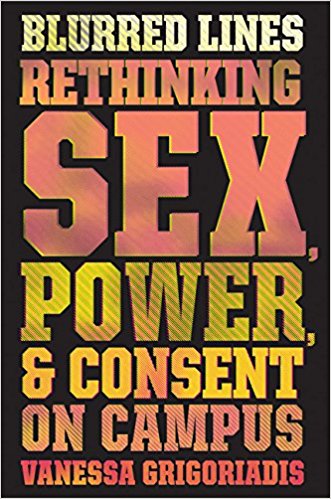
Vanessa Grigoriadis's book, "Blurred Lines: Rethinking Sex, Power and Consent on Campus (Credit: Amazon)
If reviewers are going to call out authors for factual errors, they better be sure they have their own facts straight. Case in point: The New York Times posted a doozy of a correction on a review of the book, Blurred Lines: Rethinking Sex, Power and Consent on Campus. The Sept. 7 review, “Shining a Light on Campus Rape,” by Michelle Goldberg, claims the book is “too sloppy with the facts to succeed” at answering question about campus rape, but it turns out that the errors Goldberg cited — were her own. Specifically, Goldberg’s Times review said that the book’s author didn’t know about the Department of Justice’s statistics on sexual assault on campus and that the book failed to question statistics from the Rape, Abuse and Incest National Network (RAINN), when the book showed she did.
Goldberg told Erik Wemple of the Washington Post that she “f—ed up, gravely” with her error in saying Grigoriadis didn’t “know” about certain statistics, but still arguing “one of the book’s central contentions about its subject is wrong.” That central contention is that, according to Grigoriadis, rape of women on campus is more prevalent than elsewhere. Indeed, she wrote, “the risk is college itself.”
Goldberg, on the other hand, cited statistics that she claims show “Female college-aged students (18-24) are 20% less likely than non-students of the same age to be a victim of rape or sexual assault.”
Still, making matters more awkward for the Times is that the review reads, in part, “If you’re going to challenge people’s preconceptions, you have to have your facts straight.” Goldberg’s review says the book, written by Vanessa Grigoriadis, “gives readers too many reasons not to trust it, even when perhaps they should.” That instead might be said for her review, given that she accused the book’s author of two failures that Grigoriadis did not make.
Further, the review claims the book’s author “makes baffling errors that threaten to undermine her entire book” and that the “mistakes” in the book “offer easy justification to anyone who wants to dismiss it.”
Grigoriadis, the author of the book reviewed by the Times, re-tweeted numerous posts flagging the corrections, and in one tweet, asked the reviewer, Goldberg, “Could you correct yourself or are you too busy ruining my career?”
And I spoke with four experts about the study not one. Could you correct yourself or are you too busy ruining my career?
— Vanessa Grigoriadis (@vanessagrigor) September 16, 2017
The corrections were highlighted in an opinion piece by the Washington Post‘s Erik Wemple. Grigoriadis told Wemple that she complained to the Times about the review being “factually incorrect from top to bottom” and filled with “demonstrably false statements that not only damage my book but my reputation and credibility as a reporter.”
Grigoriadis told iMediaEthics by e-mail, “This entire review grossly mischaracterizes my book. Each point is false or deeply misleading and not the work of a reputable journalist.”
Goldberg also tweeted a statement “about the current controversy” admitting she “made a serious error” but maintaining “one of the book’s major claims about its subject isn’t correct.” She also lobbed criticism at the Post‘s Wemple for not contacting her before writing about the controversy.
When contacted by iMediaEthics, Goldberg declined to comment.
The Sept. 17 correction reads,
“A review on Page 11 this weekend about ‘Blurred Lines: Rethinking Sex, Power and Consent on Campus,’ by Vanessa Grigoriadis, refers incorrectly to her reporting on the issues. She does in fact write about Department of Justice statistics that say college-age women are less likely than nonstudent women of the same age to be victims of sexual assault; it is not the case that Grigoriadis was unaware of the department’s findings. In addition, the review describes inaccurately Grigoriadis’s presentation of statistics from the Rape, Abuse and Incest National Network. She showed the case that there is disagreement over whether the data are sound; it is not the case that she gave the reader ‘no reason to believe’ the statistics are wrong.”
The Times also published a Sept. 18 correction to fix the spelling of the Dept. of Education’s Candice E. Jackson’s name.






